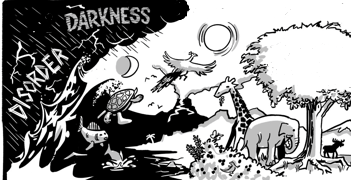EDUCATION 08 - Education meditations on Isaiah
Isaiah 28:9-13
‘To whom will he teach knowledge, and to whom will he explain the message? Those who are weaned from the milk, those taken from the breast? 10 For it is precept upon precept, precept upon precept, line upon line, line upon line, here a little, there a little.” 11 For by people of strange lips and with a foreign tongue the LORD will speak to this people, 12 to whom he has said, “This is rest; give rest to the weary; and this is repose”; yet they would not hear. 13 And the word of the LORD will be to them precept upon precept, precept upon precept, line upon line, line upon line, here a little, there a little, that they may go, and fall backward, and be broken, and snared, and taken.’
- God will teach, will explain … to anybody willing (Isa 28:13). From very young age upward.
- Teaching needs to be slow, methodical, the new concept building on the learned one, systematical, intentional.
- True education, truth, right understanding brings rest, repose, recuperation. To not understand reality, the way the world works is to think oneself in a hostile, arbitrary, not understandable universe > bewilderment, confusion, frustration, fruitlessness, fear.
- Humans can refuse to learn, to see, to know, to understand … refuse to take it from God, or from anybody else.
Isaiah 28:23-29


- This is the prophet calling on people to understand something concerning God that they do understand in normal life. He calls them to be attentive, to hear, to consider, to understand, to conclude.
- God uses Israel’s practical, agricultural knowledge to teach them. He reminds them of their understanding concerning proper work patterns. Every work has its time, its needed duration to achieve the result. Once the result is achieved, the work is discontinued (Isa 28:24). Every seed has a right place, ground, circumstance in order for planting to be successful (Isa 28:25). Every work has its appropriate tool, its right way of doing, its right system and kind of strength applied (Isa 28:26).
- God affirms the normal people’s understanding as something that is right, that is valuable and of God himself (Isa 28:26, 29). This means that God strongly affirms agricultural under-standing, work skill, practical knowledge or common wisdom as important and as of God. It comes from his ‘wonderful counsel’ and his ‘excellence in wisdom’.
- Just as this holds for practical, agricultural understanding, it also holds for God: He knows when to do something, where to do it and how to do it so it may be good, effective and fruitful. Isaiah challenges Israel to not underestimate God, but to rather trust him to be at least as wise as themselves, or rather to see him as he source of all wisdom and knowledge, even their own limited wisdom and knowledge.
Isaiah 29:9-16
‘Astonish yourselves and be astonished; blind yourselves and be blind! Be drunk, but not with wine; stagger, but not with strong drink! 10 For the LORD has poured out upon you a spirit of deep sleep, and has closed your eyes (the prophets), and covered your heads (the seers). 11 And the vision of all this has become to you like the words of a book that is sealed. When men give it to one who can read, saying, “Read this,” he says, “I cannot, for it is sealed.” 12 And when they give the book to one who cannot read, saying, “Read this,” he says, “I cannot read.” 13 And the Lord said: “Because this people draw near with their mouth and honor me with their lips, while their hearts are far from me, and their fear of me is a commandment taught by men, 14 therefore, behold, I will again do wonderful things with this people, with wonder upon wonder; and the wisdom of their wise men shall perish, and the discernment of their discerning men shall be hidden.” 15 Ah, you who hide deep from the LORD your counsel, whose deeds are in the dark, and who say, “Who sees us? Who knows us?” 16 You turn things upside down! Shall the potter be regarded as the clay, that the thing made should say of its maker, “He did not make me”; or the thing formed say of him who formed it, “He has no understanding”?’
- Persistent refusal to heed the Word of God through prophets and seers, insincere displays of devotion to God without the reality of it (mouth, lips vs hearts far away) and denial of God will lead to a blindness, an absence of understanding, an unawareness (‘sleep’), that leads to a limbo situation, I won’t, I don’t, I can’t and I don’t even realize what this will mean, what the consequences will be.

Isaiah 30:19-22
- To receive understanding, guidance is a grace. God is willing to grant it to the willing, the one crying for it, to those in need. It will be a close, personal, consistent speaking.
- God’s intervention leads to a clear understanding that will give a frame of thinking that will allow us to be stable and overcome adversity or affliction.
- God will grant a consistent, helpful and confirming revelation: what the eye sees the ear will also hear, and that will be doable (walk), and wise.
- Understanding, guidance or revelation of God will lead to true worship and a self-motivate reduction of idolatry in our lives.
Isaiah 44:18-20
- The context is: making an idol from a block of wood. God argues logic here, common understanding, simple thinking and concluding; a level that even an uneducated or less intelligence-endowed human has.
- To make a piece of wood into a god to worship and to use the rest of the wood to cook and to warm oneself makes no sense whatsoever. Why should I fear and worship the one half and casually use the other? Why would I look to something to carry my life that I made myself? Then I just might as well look after myself without worrying about gods at all.
Isaiah 45:18-19
- The word ‘chaos’ or ’empty’ is H8414, 20 times in the Old Testament, also in Gen 1:2 “the earth was formless and void”. The word means ‘chaos, waste land, desolation, wilderness, vanity, confusion, empty, formless, nothingness’.
- The contrast is between God who brings order by his creative acts versus the chaos and nothingness if he didn’t create and order.

- This implies that humans can’t inhabit an unordered, chaotic world. Where there is no natural law, no cause and effect humans can’t live, can’t make sense of, can’t act in. Humans need order. Humans need a real world run by law, where actions have consequences. A fully miraculous or mystical or arbitrary world would leave humans in a continual state of bewilderment, confusion, meaninglessness, powerlessness, inefficiency. God knows we couldn’t handle it.
- God created, God ordered, God gave existence, meaning, natural order, law. God gives continual revelation, understanding, ability to act and to cause.

- God speaks the truth, he declares what is right. God helps us to understand reality, what is true, what is real, what will work, what will yield effect, what is good and right. Here reality and morality are linked, so the morally right thing to do is also the effective and real thing to do. To do what is morally wrong means to mistreat a real thing’ it means to create confusion, disorder, un-peace, distortion, breakdown and simply damage.
- God has not meant for humans to live in a moral vacuum, nor in a state of unreality and continual bewilderment. He has revealed to us what we need to know in order to understand, to live, to act and to cause.
Isaiah 28:9-13

- God will teach, will explain … to anybody willing (Isa 28:13). From very young age upward.
- Teaching needs to be slow, methodical, the new concept building on the learned one, systematic, intentional.
- True education, truth, right understanding brings rest, repose, recuperation. To not understand reality, the way the world works is to think oneself in a hostile, arbitrary, not understandable universe > bewilderment, confusion, frustration, fruitlessness, fear.
- Humans can refuse to learn, to see, to know, to understand … refuse to take it from God, or from anybody else.
Isaiah 50:4-7
‘The Lord GOD has given me the tongue of those who are taught, that I may know how to sustain with a word him who is weary. Morning by morning he awakens; he awakens my ear to hear as those who are taught. 5 The Lord GOD has opened my ear, and I was not rebellious; I turned not backward. 6 I gave my back to those who strike, and my cheeks to those who pull out the beard; I hid not my face from disgrace and spitting. 7 But the Lord GOD helps me; therefore I have not been disgraced; therefore I have set my face like a flint, and I know that I shall not be put to shame.’
- The teacher, the helper is one who understands those he teaches, who identifies with them, who cares enough for them to want to sustain them.
- God awakens, he awakens our ear to hear, to understand, to identify in order to be able to help, to fill the need, to give something of value.
- Willingness, humility, acceptance, embracing, paying the price are essential to understand, to identify with others, to be able to help and teach them.
- This way of humility will ultimately be very effective, vindicated and effective … “I shall not be put to shame”.
